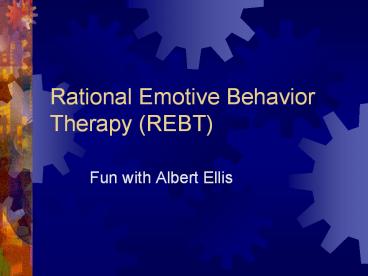Rational Emotive Behavior Therapy (REBT) Fun with Albert - PowerPoint PPT Presentation
1 / 20
Title:
Rational Emotive Behavior Therapy (REBT) Fun with Albert
Description:
Rational Emotive Behavior Therapy (REBT) Fun with Albert Ellis REBT Ellis views thoughts as rational or irrational. How do you determine for yourself whether your ... – PowerPoint PPT presentation
Number of Views:766
Avg rating:3.0/5.0
Title: Rational Emotive Behavior Therapy (REBT) Fun with Albert
1
Rational Emotive Behavior Therapy (REBT)
- Fun with Albert Ellis
2
REBT
- Ellis views thoughts as rational or irrational.
- How do you determine for yourself whether your
beliefs are rational or irrational?
3
CBT vs. REBT
- Both emphasize importance of cognitions in
determining behavior - Both work to change beliefs, thoughts, and
expectations in order to change feelings and
behaviors - Both allow therapists to be directive and active
- Both are very structured approaches
4
CBT vs. REBT
- Faulty thinking
- Information processing model
- Schemas
- Inductive approach
- Open approach, Socratic dialogue, collaborative
empiricism - Warm, trusting therapeutic relationship
- Irrational thinking
- A-B-Cs of behavior model
- Illogical beliefs
- Deductive approach
- Persuasive, confrontational, directive, logical
- No need for therapeutic relationship
5
Major REBT Hypotheses
- Human beings have a biologically based tendency
to create and subscribe to deeply held beliefs
about themselves, other people, and the world
around them. - These beliefs can importantly influence emotions
and behaviors (and other types of cognitions and
cognitive processes).
6
- Certain types of beliefs will contribute to
self-enhancing, goal-promoting emotions and
behaviors other sorts of beliefs will contribute
to self-defeating emotions and behaviors. - It is possible to identify and modify the sorts
of beliefs that contribute to self-defeating
emotions and behaviors.
7
- Modifications of these beliefs can help an
individual to be less vulnerable to emotional
disturbances and dysfunctional behavior. - Since these beliefs are often deeply rooted
within an individuals personality, modifications
of them can involve a significant amount of
ongoing and consistent effort.
8
View of Human Nature
- Neutral
- Potential for positive (rational) and negative
(irrational) behavior - Self-preserving and self-destructive
- Free will
9
Theory of Personality
- Biological/Social/Psychological influences
- Simultaneous nature of thinking, feeling, and
behaving - Active creators of our world
- A-B-Cs of behavior
10
ABC Model
- Aactivating event
- An individuals perceptions and inferences
concerning the events and conditions that occur - Bbelief
- Includes both rational and irrational beliefs
that an individual brings to bear upon the
activating event - Cconsequences (emotional and behavioral)
- Outcomes that the individual experiences as a
result of holding specific beliefs
11
Problem Development
- Irrational Beliefs
- Learning
- We are active creators of our problems
12
Rational Irrational Beliefs
- Rational functional beliefs that contribute to
individuals welfare, satisfaction, and
happiness. - Irrational dysfunctional beliefs that
contribute to significant episodes of emotional
disturbance and problematic behavior - Makes one more vulnerable to unwanted emotions
and behaviors in the future.
13
Demandingness
- Irrational beliefs embody absolutistic, rigid
demands, and can be verbally expressed in the
form of shoulds musts have tos and ought
to bes - ExampleI must have the love and approval of my
significant other (must is absolute) - I want the love and approval of my significant
other, but I do not need this.
14
Verifiability
- Irrational beliefs are almost always empirically
inconsistent with reality. - With the prior example It is not an utter
necessity for adult human beings to be loved by
those they consider significant they can
survive and still be happy, even without such
love.
15
Logical Consistency
- Rational beliefs are usually logically
consistent. - ExampleIt is good to be successful at ones
job therefore, I want to be successful at my
job. - As opposed to, It is good to be successful at
ones job therefore I must be successful at my
job.
16
Mechanisms of Change
- Changing beliefs and thoughts
- Two paths
- Changing beliefs gt changes emotions and behaviors
- Changing behavior gt changes beliefs/thinking
- Accepting our limitations and flaws
17
Disputing Irrational Beliefs
- Logical disputing
- Using logic
- Empirical disputing
- Using evidence or examples
- Pragmatic disputing
- Using practical consequences
- Structured disputing
- Using worksheets or books
18
Other Techniques
- Identify irrational thinking
- Practicing new thoughts and behaviors
- Behavioral methods
- Homework
- Trying different behaviors
19
Therapeutic Process
- Therapist
- Active Directive
- Teaching
- Logical Persuasive
- Goals
- Change irrational and illogical thoughts/beliefs
- Long term behavior change
20
Ellis with Gloria
- What to listen and watch for
- Directiveness
- Persuasiveness
- Use of ABC Model
- Activity (comparison of time speaking)
- Glorias reaction































